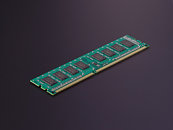- Joined
- Oct 9, 2007
- Messages
- 47,812 (7.40/day)
- Location
- Dublin, Ireland
| System Name | RBMK-1000 |
|---|---|
| Processor | AMD Ryzen 7 5700G |
| Motherboard | Gigabyte B550 AORUS Elite V2 |
| Cooling | DeepCool Gammax L240 V2 |
| Memory | 2x 16GB DDR4-3200 |
| Video Card(s) | Galax RTX 4070 Ti EX |
| Storage | Samsung 990 1TB |
| Display(s) | BenQ 1440p 60 Hz 27-inch |
| Case | Corsair Carbide 100R |
| Audio Device(s) | ASUS SupremeFX S1220A |
| Power Supply | Cooler Master MWE Gold 650W |
| Mouse | ASUS ROG Strix Impact |
| Keyboard | Gamdias Hermes E2 |
| Software | Windows 11 Pro |
Elpida and Buffalo Technologies have unearthed a memory standard never before heard, and thought by many, as the limits of current DDR3 technology, given the silicon fabrication process current DRAM chips are made with. The elusive PC3-19200 standard has been achieved. Elpida has tested stable, a prototype memory module that runs at 2400 MHz DDR (1200 MHz actual clock-rate). The modules use Elpida's 2.5 Gbps DRAM chips.
These speeds, however, come at the cost of latencies and voltages. The module was tested stable at 2400 MHz only at 11-11-11-34, and a voltage of 2.1 V, which is high, by DDR3 standards. However, the module locks a surprise when it comes to the same numbers: The module was tested stable at 2096 MHz, at amazingly low 1.5V, with much tighter timings of 9-10-9-24. The companies wish to put this to mass production soon.


View at TechPowerUp Main Site
These speeds, however, come at the cost of latencies and voltages. The module was tested stable at 2400 MHz only at 11-11-11-34, and a voltage of 2.1 V, which is high, by DDR3 standards. However, the module locks a surprise when it comes to the same numbers: The module was tested stable at 2096 MHz, at amazingly low 1.5V, with much tighter timings of 9-10-9-24. The companies wish to put this to mass production soon.


View at TechPowerUp Main Site




